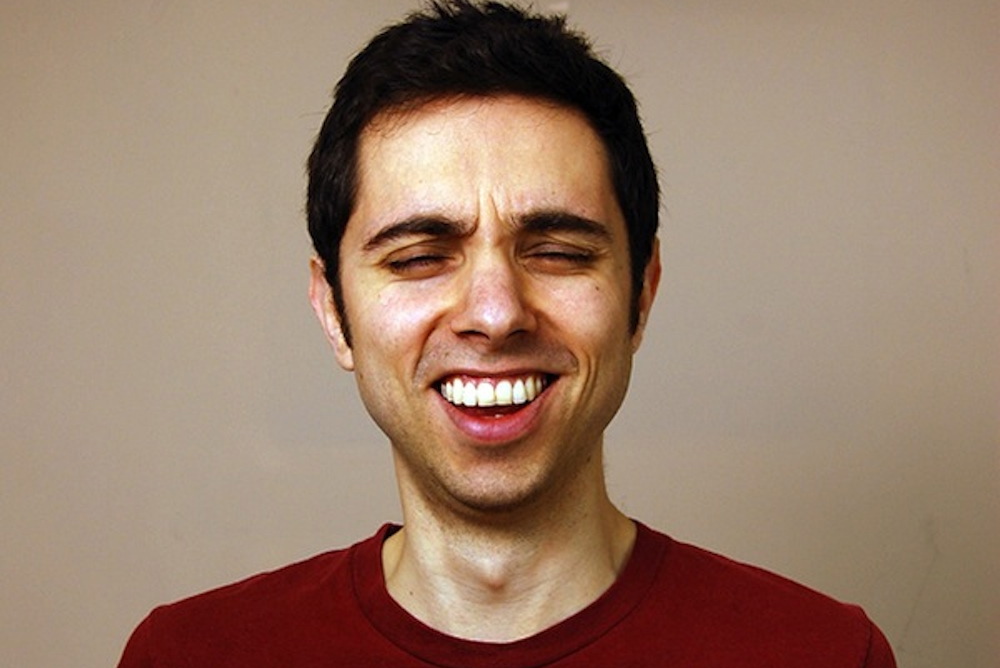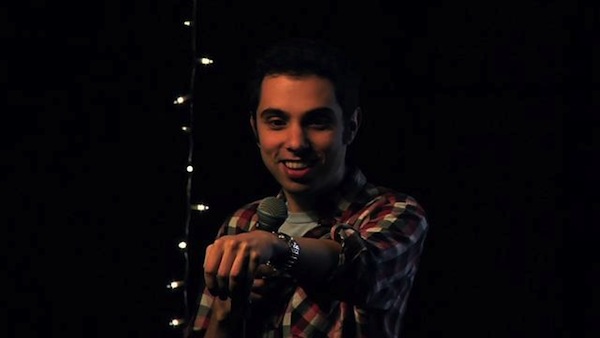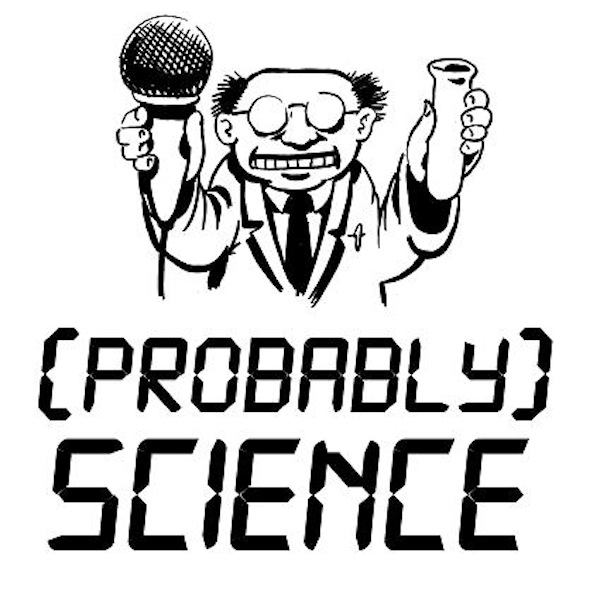Comedian Matt Kirshen might have boyish good looks, but he is a true comedy veteran with a resume that includes Late Night with Jimmy Fallon, Craig Ferguson, a finalist on Last Comic Standing, Comedy Central specials and a super hilarious and super successful album in “I Guess We’ll Never Know.” The London born funny man has won over us Americans but also performs worldwide from Leeds to Bermuda. Yet he is still getting critical acclaim, being named “Top Comics to Watch in 2013” by LA Weekly. His touring schedule is crazy and dude just works hard. And did I mention he co-hosts one of my fav podcast, “Probably Science“? It was a blast interviewing Matt, so read it now and get your blast on as well!
____
____
Serial Optimist: Greetings Matt! You have one of the best smiles on the comedy circuit. Have those pearly whites every landed you in any sticky predicaments?
Matt Kirshen: Thank you. I’ve often felt that “best smile” is an overlooked quality in a professional humorist. Sticky Predicaments was the name of the specialist-modeling agency I used to belong to. So yes.
SO: You often joke about having an “awkward, weird childhood.” How did the setbacks of youth prepare you for audiences you would encounter down the line?
Matt: I did, but it’s only when you get older that you realize everyone was awkward: some just hide it well. And some wear it on their unfashionable sleeves, remember every moment, and then start writing jokes.
SO: So many of the British comedy greats honed their comedy skills at university. Can you tell us a little bit about your experiences writing for Clare College’s satirical magazine “Clarieification” and starting up a comedy club?
Matt: What I got out of Cambridge in general was a really supportive environment to start doing things. The magazine was going before I got there, I started to submit jokes and articles, and it was my first taste of writing comedy, then seeing people laugh at my stupid ideas. Turns out, that feeling’s quite addictive. What I also got, once I started stand-up, were large, encouraging audiences, who’d seen me before, so I had to write new material for every show. It was a hugely unrealistic introduction to properly starting comedy, where you trawl the same 5 minutes around in front of 8 largely uninterested people.
SO: Why do you think so much British programming has been adapted for American consumption? What prompted you pursue comedy in the States?
Matt: It’s gone both ways. I remember a particularly awful British remake of the Golden Girls growing up, and that’s far from a one-off. There have even been several different UK versions of your The News. It has some of the same stories, but a different cast.
America for me happened kind of by accident. I auditioned in London for Last Comic Standing in 2007, never having seen the show before (it wasn’t broadcast in the UK before my season) and found myself on a plane to LA. So far your country’s been pretty kind to me. It seems a shame not to stick it out.
SO: You’ve performed comedy all over the world. Who are some of the most difficult audiences to please abroad? What’s been your most trying travel experience?
Matt: The UK was a great place to start for that – there’s a whole circuit of foreign shows booked out of there. Finland was odd because I was the only English-speaking act on the bill and had no idea when I was about to be brought on, or what anyone else had talked about. I had to ask one of the other comics, “Is he introducing me now?” “No – he is doing a joke about soap.”
The Dutch are appreciative, but stoic. As long as you remind them to laugh at jokes, they’re normally ok. Otherwise, they’ll sit in silence for your whole show, and then applaud wildly at the end.
I’m not sure about trying times. In Singapore, we once saw a high, bleeding, half-naked wannabe gangster chase another junior goon through a late night food market with a meat cleaver. But that was more scary than trying.
____
Matt On The Late Late Show
____
SO: Who are some of the comedians you admire and why?
Matt: So many. In the UK, Nick Doody, Carey Marx, Andrew Maxwell are all endlessly inventive and watchable.
Glenn Wool has moved from the UK to the US recently and has some of the smartest material that doesn’t seem to be smart at all.
In America I think Bill Burr is the most rock-solid stand-up I’ve had the joy of seeing in the last year. Maria Bamford is the most inexplicable. Her brain works at such a right angle to most people, it’s impossible to analyze her as a fellow comedian – she forces me to be an audience member and just enjoy the ride.
SO: Why do you think Americans are so terrible at doing British accents but not visa versa?
Matt: I think we’re both pretty bad at doing each other’s. Mine’s bad enough that I only do it when I’m trying be understood by an American voice recognition system. United Airline’s computer won’t laugh at you. That’s one of their promises.
I think the mistake everyone makes is not sticking to one type – Brits doing American range from Midwest to Southern to New York in a sentence, and Americans trying to be British go from The Queen to cockney, sometimes in the same word. They’ll do posh vowel sounds with working class consonants.
If Brits are actually better, maybe it’s just because there’s less variety and subtlety to American accents – the UK ones are a legacy of hundreds of years of people never leaving their village and vary wildly over short distances; the US is a much younger country and someone in Missouri, say, doesn’t sound too different to someone 1000 miles away in Colorado. Plus British actors grow up watching US movies and TV and imitating them. The US maybe got one English TV show or movie a year, and it would either feature cockneys or butlers.
Not a funny answer, but I think it’s pretty accurate.
SO: I recently read an article that said UK comedy is going through a crisis similar to the one the US did in the 90s. Do you find that is really the case?
Matt: I’ve not been in the UK much recently, but the scene’s definitely changed from when I started. Whether it’s as bad as the boom and bust that happened in the US, I don’t know, but there’s certainly been a two-tier thing happening, where acts that are on TV are selling bigger than ever, but regular club nights are declining. But right now, the UK’s in a recession – that won’t last forever and hopefully people will have more spending money – and unlike 80’s America, we now have the Internet. Niche acts are finding their audiences.
SO: What are your views on the whole UCB controversy? Should comedians get paid when audience have to pay for tickets?
Matt: I’ve been paying little attention to it, to be honest. This is about the New York UCB, which I’ve never set foot in, let alone performed at, and features comedians I’ve never met. If a venue’s genuinely making a fortune and ripping off the performers, then that’s not right, but if the overheads are huge and they’re using the successful shows to subsidize the smaller ones, then good for them.
SO: Having studied Mathematics at university have you found that this discipline has an inherent comedy to it? Some of the funniest teachers I had growing up were Math teachers.
Matt: Yup. We had some pretty wild times in those lectures. I remember once in the Markov Chains class, the lecturer reached for what she thought was a red pen, but it was actually blue. That was about as good as it got, though.
Dicking aside, there is some overlap in skills. Writing a joke uses some of the same lateral thinking and problem solving that I needed as a student. And mathematicians and joke-writers have the same fondness for concise solutions. Generally the fewer the words in a joke, the stronger it is. That’s how you can tell most of my answers in this interview aren’t funny.
____
SO: One of my favorite podcasts is one you host with comedian pals Brooks Wheelan and Andy Wood. How did “Probably Science” get started?
Matt: Thank you! I’d had the idea of a topical science podcast featuring not-necessarily fully informed comics brewing for a while, when I did a show with Brooks, and he mentioned working in a lab. The next day I gigged with Andy and he said he used to be an Engineer. I went from knowing no sciency comedians to two in 24 hours, pitched them the idea of a topical science podcast and the two of them, being far more proactive than me, started getting on with actually making it.
SO: Who have been some of the most engaging guests on the podcast? If you had the opportunity to go back and time and interview some Mathematicians, who would you pick and why?
Matt: Some of my favorite guests have been the ones who knew nothing about the topics at all, but ran with every idea. On one of the first episodes, we tried to explain the Drake equation to Kyle Kinane and ended on a conversation about almighty farts. Things like that make me very happy.
As for historical interviews, I’d pick two: Évariste Galois created entire branches of mathematics, including one named after him, was arrested for threatening the king’s life, spent 6 months in prison for being part of a private militia and died in a duel, all by the age of 20. Unfortunately, though, he was from France, and with my high school French, the most I could ask him is if he has any siblings, and where is the post office.
And Isaac Newton, possibly the greatest scientific and mathematical mind of all time. Again, he accomplished most of his greatest work when he was a full decade younger than I am now, then turned to alchemy, during which time he got mercury poisoning, went a bit mad, and spent 30 years trying to prosecute counterfeiters. I think I’d want to get him around the age of 30, which was roughly the tipping point from scientific genius to political maniac.
SO: When do you think the “Nerds are cool” bubble shows any sign of bursting? I’m hoping it never ever does.
Matt: I’m not sure it is a bubble, and I’m definitely not qualified to say what is or isn’t cool. I spent my most of first year at university learning to juggle.
What is happening, though, is they’re far more visible. Now, if you’re into comic books, you’re not by yourself in the corner. Now you can find hundreds of other people into the same things, and arrange to meet up in big convention halls that have loads of corners, so you can take a corner each and wave at each other from across the room. Then later, at the party, you can recreate the dance The Fonz did in Weezer’s Buddy Holly video, knowing that everyone will remember it from the Windows 95 CD. This is a good thing.
SO: What projects and touring do you have planned for 2013?
Matt: If any of your readers are UK-based, I’m in the TV version of Set List, the Troy Conrad and Paul Provenza-helmed improvised stand-up show. It’s on Sky Atlantic in April. It’s also on ABC2 in Australia, but my episode’s already gone out there. Not that you shouldn’t watch the other episodes. It’s one of the shows I’m most proud of and so fun to do. Look out for an American version of it very soon too.
I’m also about to tape a segment on BBC America’s Nerdist show and there are a couple more things that are likely but I don’t want to jinx them. Follow me on Twitter or Facebook and I’ll send you mini-announcements when they’re happening. They’ll be scattered amongst stupid jokes. Sorry about that.
____
SO Note: Check out all kinds of fun on Matt’s website at mattkirshen.com, follow him @mattkirshen, click here to buy his album I Guess We’ll Never Know, and absolutely listen to the podcast he co-hosts Probably Science!




